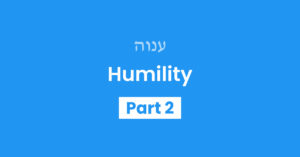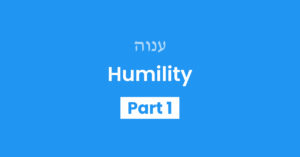So far we have discussed how humility means recognizing that we cannot take credit for our natural, inborn talents; rather, our talents and strengths are just tools given to us by Hashem in order to fulfill each of our unique missions in this world. Furthermore, having humility means seeing the greatness in other people and recognizing that my own strengths do not make me any greater than anyone else. Every person is given different strengths to serve Hashem in different ways.
As we mentioned earlier, the most humble person who ever lived was Moshe Rabbeinu. What made Moshe more humble than anyone else?
The Gemara1 says that Moshe and Aharon were on a higher level of humility than the 3 Avos, because Avraham said, “V’Anochi Afar Va’Eifer – I am [just] dust and ashes“2 whereas Moshe and Aharon said: “V’nachnu Mah- What are we?“3 In other words, Moshe and Aharon felt like they were nothing at all, whereas Avraham felt he was at least something (i.e. dust and ashes).
But how could Moshe say he was nothing? He was the greatest prophet who ever lived4 and achieved the highest levels of perfection, more than any other human being! How could Moshe say he was nothing?
The Sifsei Chaim5 answers by explaining that the more a person recognizes the greatness of Hashem, the more he realizes his own lowliness. As the greatest prophet who ever lived, Moshe Rabbeinu was able to understand Hashem on a level higher than any other person; Chazal say it was as if all other prophets “saw” Hashem through a blurry glass, but Moshe “saw” Hashem through a clear glass.6
The more a person recognizes the greatness of Hashem, the more he realizes his own lowliness.
Of course Moshe knew he was on a high spiritual level, but because he had such a high grasp of the greatness of Hashem, he understood on a deeper level what true perfection looks like. Seeing Hashem’s awesome perfection made Moshe realize that even though Moshe was on such a high level, there was still so much more room to grow. Moshe felt his lowliness against Hashem and felt like nothing compared to Him.
When we are striving to achieve high levels in middos, Hashem is our ultimate role model for perfection. For example, when someone insults us, we try to hold ourselves back from responding in anger, even if we are simmering inside. But Hashem – who exemplifies perfect middos – displays an even higher level of tolerance. The Tomer Devorah writes7 that at the time any person is sinning, Hashem tolerates this huge insult and continues to pour energy into the person’s limbs, allowing the sinner to continue to live and sin against Hashem. A regular person might say: “If you are going to hurt me, at least do it with your own power!” But Hashem shows infinite levels of tolerance by continuing to support the sinner even at the very same moment he is sinning.
When we are striving to achieve high levels in middos, Hashem is our ultimate role model for perfection.
When we contemplate this awesome level of tolerance, it makes our own acts of tolerance pale in comparison to what Hashem does. We try to be tolerant of other people and overlook their faults, but our own achievements in the realm of tolerance are almost nothing compared to the level of tolerance that Hashem displays.
Not only can we look toward Hashem as our role model in middos, but often even other people can be role models to show us how much more room we have to grow. For example, you may be feeling smug about yourself for hosting a large number of guests for Shabbos. But then you hear of woman who took 3 foster children into her home and raised them from infancy to marrying them off… and suddenly your own act of kindness seems to shrink in comparison!
Not only can we look toward Hashem as our role model in middos, but often even other people can be role models to show us how much more room we have to grow.
Of course, we shouldn’t be looking over our shoulders too much to see what other people are doing. It’s not healthy to always be comparing yourself to other people, and we must always remember that we each have a unique way of growing, and growth is a slow, gradual, step-by-step pocess. But every once in a while, it’s good to take a peek at what people – or Hashem – are doing that shows high levels of perfection in middos, because it reminds us how much room there is to grow.
This sense of realizing just how far we are from ultimate perfection is what keeps us feeling humble and prevents us from taking too much pride in our accomplishments. What we are doing is great, but we are not all the way there yet.
This is how Moshe Rabbeinu was able to maintain his humility even on such a high level. Moshe saw Hashem’s awesome perfection and felt tiny in comparison.
Indeed, the Orchos Tzaddikim says8 that one way to acquire humility is that a person should contemplate the greatness of Hashem and think: “What am I? I’m just a lowly creature living in this lowly world. Even if I would do all the good deeds that I can, they would be just a small drop in the ocean compared to what I am obligated to do.
This week, let’s try to deepen our sense of humility by noticing areas where we are not yet perfect, and where we still have room to grow.
Sources: [1] Chulin 89a; [2] Bereishis 18:27; [3] Shemos 16:7; [4] Devarim 34:10; [5] Sifsei Chaim: Middos V’Avodas Hashem, Vol 1 pg. 137-8; [6] Yevamos 49b; [7] Tomer Devorah: Chapter on “Mi Keil Kamocha”; [8] Orchos Tzaddikim: Shaar Ha’Anavah
Your Challenge
Every day, think of 1 way that you are not yet perfect in some area.
FOR EXAMPLE:
- Although I daven every day, I still need to work on having more kavannah.
- Although I enjoy doing favors for my friends, it would be even better if I would also did favors for the people whom I’m not such good friends with.
- Although I am a good tutor, I would be an even better tutor if I had more patience for my students when they have a hard time understanding the material.
Torah Questions
- Which passuk in Tehillim Chapter 138 says that Hashem is high yet sees the lowly?
- Pirkei Avos 4:4 tells us that a person should be very, very humble. What reason is given?
- Pirkei Avos 5:19 says that a humble person is considered a student of _____?
- Which Hebrew words do we say in the “Ezras Avoseinu” paragraph (before Shemoneh Esrei) which mean that Hashem lowers the haughty and raises the lowly?
- Which Hebrew words do we say in davening that mean: “Let my soul be like dust to everyone else…”
- The Gemara (Taanis 7a) says that divrei Torah are compared to water, and gives a reason that relates to humility. What is the reason for this comparison?
- The Gemara (Taanis 7a) says that if a person is haughty, his dust will not move [at the time of Techiyas HaMaysim]. What passuk does the Gemara use to support this?
- When Hashem first created the world, He made the sun and moon of equal size. But the moon said it didn’t make sense for 2 luminaries to be of equal size – it would be like 2 kings sharing 1 crown. So Hashem made the moon smaller. How did Hashem reward the moon for accepting its smaller size? (See Bereishis Rabbah 6:6)
Questions to Ponder
- The Gemara (Taanis 7a) says that divrei Torah can only be sustained in a person who is humble. Why? Why can’t a haughty person know Torah also?
- The Gemara says that Hashem only gives prophecy to people who have 4 qualities: Strong, wealthy, wise, and humble. Why are these 4 specific qualities necessary for receiving prophecy?
- In the order of the Mesilas Yesharim and Rabbi Pinchas ben Yair, why does Chassidus come before Anavah, and why does Anavah come before Yiras Cheit?
- The Midrash says that when Moshiach comes, Eliyahu HaNavi will go onto the roof of the Beis HaMikdash and say to the Jewish people: “Humble ones! The time for your redemption has come!” Why is it important for Eliyahu to call the Jews humble at the time of Mashiach coming? Why doesn’t he praise us for being kind, G-d-fearing, or any other positive quality?




